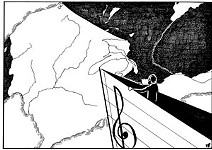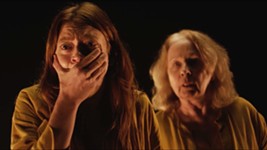Graham Reynolds Bugs Out With Insectum
New Golden Hornet collab project mines the sonic world of insects
By Richard Whittaker, Fri., Feb. 16, 2024
Graham Reynolds may be known as a musical genius, but his fascinations expand beyond his sonic endeavors. He takes joy in showing the barrier between the arts and sciences is as diaphanous as the wings of a dragonfly. His latest collaboration from the hive mind of his Golden Hornet project, Insectum, points a musical microscope into the realm of beetles, flies, bees, and butterflies.
The nine-track album receives its world-premiere live performance at Austin’s Draylen Mason Music Studios on Feb. 22 as part of KMFA’s Offbeat series. Reynolds and classical cellist Jeffrey Zeigler (formerly of the Kronos Quartet) had worked together before on a similar project with The Sound of Science. “As soon as that was done, we went, 'What are we going to do next?’” Reynolds recalled.
Inspiration came from the work of groundbreaking 17th-century German naturalist Maria Sibylla Merian, whose illustrations of insects formed an essential and beautiful archive for researchers. With a new subject for study, they encouraged Berlin-based experimental composer and percussionist Susie Ibarra to join their musical swarm. “All three [of us] equally on board as creators, collaborators, co-owners of the project,” Reynolds said, but each bringing a different background: Ziegler from the tradition of annotated scores; Ibarra being known as an improviser and experimentalist; “and me being a bit of both.”
However, the pandemic threw any plans for in-person collaboration into chaos, so they evolved a new process: working on individual pieces before sending it to the other members of the trio. “They would transform it, add layers, and send it back,” Reynolds said, such as taking the sound of a fly and using it as a sample. “Another approach was pulling up YouTube, finding some cool insect video, playing music like it was a live film score, and then just taking the video away,” Reynolds added.
The result was over 30 partial ideas for tracks that Reynolds dubbed “sketches.” But these were mere pupa, awaiting their final reconstitution. Enter two more essential members of the ensemble: academics and bug experts Alex Wild and Jo-anne Holley. As part of his research, Reynolds audited Wild’s entomology course at UT-Austin, and he and his wife came on board as consultants and advisers. The trio played them those early sketches, and the entomologists would give them feedback on what the relevant insects sounded like, or on their behavior or life cycles. Their insight profoundly affected the final piece, as with “Army Ants.” Reynolds described the initial sketch as “regimented, [but] they explained, 'Army ants attack in a chaotic swarm.’ So this sequence for them did not sound like an army ant attack. So, Susie added a whole long drum intro that was her interpretation of an army ant attack.”
With the work becoming more refined and the pandemic abating, the composers were able to come together for a final collaboration and recording at the National Sawdust music venue in Brooklyn. “There’s nothing like the communication you get when you’re in the same room,” Reynolds explained. “Hearing the same things they are, eye contact and you can cue each other. ... Tracks that were in our initial sketches three minutes long would in person become a 12-minute track.”
The pandemic had another effect on Insectum: It reinforced how essential it is to consider the world we share with insects and how outsize our impact is on their existence. As a seasoned touring musician, Reynolds recalled how he would drive just a few miles and his windscreen would be covered in splattered bugs. “Now you drive to Houston or New York, and there’s nothing.” However, he saw those populations come back during the pandemic. “When humans stopped going out,” he said, “a lot of animals were really happy about it.”
Insectum: Presented by the Offbeat Series at KMFA 89.5
Thursday 22, Draylen Mason Music Studio











